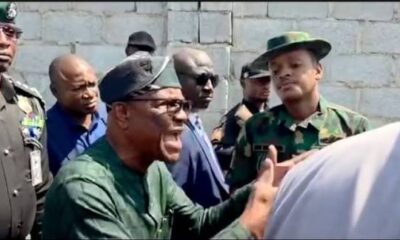Political Issues
The Farce Of Political Participation In Nigeria -By Odukoya Adeniyi
Banky W, who was announced as the winner of PDP’s House of Representative primary election for Eti-Osa federal constituency in Lagos State, found out yesterday that his name did not appear on the result sheet being circulated on social media as the winner. It was contrary to the scenes caught in a video where the votes were counted, and it was officially announced that Banky W got the highest number of votes cast by the party delegates.

Sixty-two years ago, Nigeria became an independent state—for the record, the 29th African country to gain independence from the shackles of colonialism. Houses’ doors were flung ajar, and citizens took to their heels, celebrating as a seemingly far-fetched dream became a reality; yes, their long-hauled agitation for independence finally paid off. In 1959, there was an election masterminded by the British Colonial masters. It led to the emergence of Nigeria’s foremost nationalists and statesmen—Tafewa Balewa of Northern People Congress (NPC), Obafemi Awolowo of Action Group (AG), and Nnamdi Azikwe of National Council For Nigerians and Cameroons (NCNC).
The end to which a bureaucracy of power was established, devoid of prejudice to exalt one party higher than the others. Everyone had a fair cut. Yet, NPC found NCNC worthy of a two-sided beneficial alliance. This alliance would later be the bedrock upon which Nnamdi Azikwe became Nigeria’s Governor-General and Tafewa Balewa, Prime Minister. In this structure, AG served as the official opposition. And this was the modus operandi until the 1964 election which succeeded Nigeria’s new status as a republic state— attained in 1963. For anyone conversant with Nigeria’s political history, a denial of the electioneering shambles replete in Nigeria’s 1964 general election would be a treason worthy of getting exiled.
The election which was overseen by the Federal Government proved to be incapable of producing clear-cut elected candidates without controversies, awful brickbats, foul plays, and partiality. The obvious failure of the 1964 general election began what would be Nigeria’s definitive electioneering nature till this very point in 2022— fifty-eight years ago. If you take time out to filter through the whispers of the public, you will discover a high odds describing Nigeria’s independence as quacky, premature, and hasty.
For sure, this isn’t solely based on the failures of the 1964 general election, rather it is the culmination of the country’s expansive and uncontrollable thirst for catastrophe. Beyond 1964, in other elections coupled with the momentary involvement of Military power, the country has consistently retained her inadequacies across all sectors. It is 2022 and the general election seems to be lurking around, powers are about to change hands in 2023. Despite the clamors here and there, imploring people to take active participation in the forthcoming elections, there are persons who outrightly disapprove of the credibility of elections in Nigeria, stating that votes do not determine who wins an election or not. They believe the results of elections are often influenced by the ruling party. To this claim, they cite so many instances.
For instance, Banky W, who was announced as the winner of PDP’s House of Representative primary election for Eti-Osa federal constituency in Lagos State, found out yesterday that his name did not appear on the result sheet being circulated on social media as the winner. It was contrary to the scenes caught in a video where the votes were counted, and it was officially announced that Banky W got the highest number of votes cast by the party delegates. As wild as this might seem, it captures significantly the conundrum of Nigeria’s political interface. How do you explain this to set individuals with no ounce of faith in Nigeria’s electoral procedures? It is the sheer farce of political participation in Nigeria.
Another good example is the Osun State Governorship election in 2018 between Gboyega Oyetola and Ademola Adeleke. It was reported election procedure was marred by violence, police brutality, and irregularities in a bid to ensure the election favors a particular candidate. People got injured, and some were killed because of their exercise of franchise— the right to vote and be voted, which I rephrase, within Nigeria’s political context, as the right to be killed by hoodlums used by political cabals; as the right to either be kidnapped or delayed on a long queue with your vote playing an insignificant role in the election of new leadership.
The truth be told, this is the farce of political participation in Nigeria: voters are victims of violence at election polls, votes are bought, votes are inflated and deflated as decided by the smartest of the game. In this place, the numbers on your screen decide fate, not the stamp of your fingers at election polls.
The Nigeria Civil Society Situation Room reported an estimate of 626 persons murdered in Nigeria during 2019 general and supplementary election. This suggests that election polls are viable to attacks from hoodlums and miscreants hoping to influence the election fate of their godfathers. However, this is not suggestive of political apathy, rather it is to interrogate the motive of INEC and political parties going into the 2023 general and gubernatorial elections; to provoke a vibrant prioritization of voter’s safety, and votes credibility.
Odukoya Adeniyi is a Nigerian Poet, Essayist and Freelance Writer. He is the author of the Poetry Chapbook, Preserve This Light, published by PoetsInNigeria. Reach out to him on twitter: @adeniyi_odukoya








